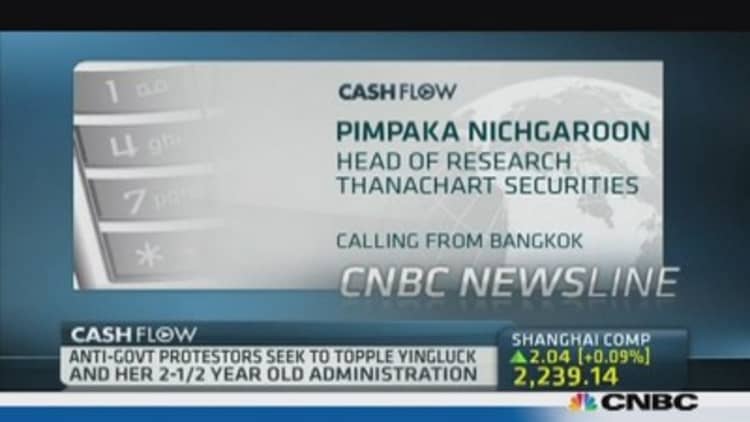
Thailand's prime minister on Monday dissolved parliament and called a snap election, but analysts say the step may have come too late to stop the waves of anti-government protests which have crippled the capital since early November.
"The problem this time may not be easily resolved by a simple house dissolution," Pimpaka Nichgaroon, head of research at Thanachart Securities, told CNBC. "The house dissolution has come so late that protesters have built up momentum to the point where they are now demanding an unelected interim government to reform Thai politics before Thailand can head into the new elections."
She isn't the only one concerned about the democratic process in Thailand.
(Read more: Thai Prime Minister calls snap election, protesters press on)
"Ultimately, they probably want some form of democracy to be preserved in Thailand," Derek Bloomfield, an analyst at Deutsche Tisco, told CNBC. "They will probably come back to that, but in the interim period, they may have another set of ideas."
Protest leaders have also said the dissolution won't end their demonstrations, with anti-government leader Suthep Thaugsuban saying he would continue a march on Monday to the prime minister's offices at Government House.
Thailand has been beset by periodic political unrest in recent years, with some incidents turning violent. Much of the turmoil dates from a 2006 military coup which ousted then Prime Minister Thaksin Shinawatra.
(Read more: Violent protests expose cracks in Thai economy)
The latest demonstrations were triggered in early November by parliament's consideration of a government-backed amnesty bill that could have allowed Thaksin to return home without facing time in prison for a graft sentence in 2008 as well as granting immunity to politicians implicated in 2010 violent protests which killed about 90 people.
While that bill was dropped, the street protests have broadened out to an explicit call for current Prime Minister Yingluck Shinawatra, who is Thaksin's sister, to step down.
(Read more: Political protests spook Thai central bank)
Analysts are also watching whether the opposition Democrat party will boycott the election after its lawmakers resigned en masse from the lower house of parliament over the weekend, in a move that reduced the 500-member body to 347. The party boycotted the election in 2006, shortly before Thaksin was ousted from power.
"If they participate, that's a good sign. Then the protest momentum will continue to die down because everyone will continue to play by the rules," Kasem Prunratanamala, an analyst at CIMB, told CNBC. He ranks the chance of a boycott at "50-50."
(Read more: Thailand's investors spooked by 'forgiveness')
In the meantime, financial markets initially reacted positively to the news, with the Thai baht strengthening against the dollar. The U.S. dollar slipped as low as 32.03 baht, from around 32.24 baht before the announcement of the new elections; it later retraced to 32.13.
The SET index initially traded up as much as 1.2 percent to 1378.02 at the open, but later gave back some of its gains, trading flat by mid-day.
Deutsche Tisco's Bloomfield said the moves may have been due to some fresh hope for a resolution.
(Read more: This Asian nation faces a growing crisis from aging)
"Whereas before it was a clear impasse, maybe some people see this as clearing or partially removing the impasse and a step toward resolution," he said.
But he said his view on the Thai market hadn't changed from a note he published late last week advising using any resilience in the SET to lighten up on Thai stocks in the near term. His note kept a 1560 target for the end of 2014, which he didn't view as a compelling risk-reward.
Nomura analyst Euben Paracuelles warned of near-term and long-term economic impact in light of the political unrest in Thailand, adding markets should not be complacent.
"Virtually all expenditure-side components of gross domestic product could be affected" by the protests, Paracuelles said in a note.
He expects domestic demand, weakening private sector sentiment and a decline in tourism-related services exports. October's tourist arrival growth has already slowed to 14.7 percent from a year earlier from 27.7 percent in September, he noted, adding it will likely weaken further as more countries issue advisories against travel to Bangkok.
In his worst-case scenario of a deteriorating political situation, Thailand's fourth-quarter gross domestic product (GDP) could contract 1.2 percent from the year-earlier period, although Nomura's base case is for economic growth of 1.4 percent, compared with the third quarter's 2.7 percent growth.
-- CNBC's Elly Whittaker contributed reporting to this story.
— By CNBC's Leslie Shaffer. Follow her on Twitter: @LeslieShaffer1

